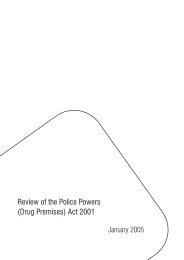Crimes (Forensic Procedures) Act 2000 - NSW Ombudsman - NSW ...
Crimes (Forensic Procedures) Act 2000 - NSW Ombudsman - NSW ...
Crimes (Forensic Procedures) Act 2000 - NSW Ombudsman - NSW ...
Create successful ePaper yourself
Turn your PDF publications into a flip-book with our unique Google optimized e-Paper software.
7.2.7. What if consent is withdrawn<br />
The <strong>Act</strong> provides that if a person withdraws consent before or during the carrying out of the procedure, the person is<br />
deemed to have refused to consent to the procedure, and it cannot proceed except by order of a senior police officer<br />
or a court. 544<br />
Some submissions raised concerns about what may happen to any forensic material which may have been obtained<br />
before consent was withdrawn. 545 Legal Aid <strong>NSW</strong> suggested that any forensic material obtained before consent is<br />
withdrawn should have to be destroyed, and that a court could order that it be retained if satisfied that the probative<br />
value of the evidence would otherwise be lost.<br />
In practice, we found that if a suspect withdraws consent before or during a forensic procedure, police would only<br />
proceed by order of a senior police officer or a court.<br />
Case Study 24<br />
A man was arrested after assaulting security officers at a university. Police asked him to provide a DNA sample<br />
by buccal swab, and he declined. Police explained that a senior officer could make an order to take a DNA<br />
sample if he did not consent. The man again declined to provide a sample by buccal swab but changed his<br />
mind before a hair sample was taken. Police recorded his consent on video and began to take the swab.<br />
However, the man withdrew consent. A senior officer from another police station attended and made an order<br />
for a DNA sample to be taken by hair sample, and the hair sample was taken. 546<br />
The <strong>Act</strong> already provides that if a person withdraws consent before or during a forensic procedure, police cannot<br />
proceed unless they obtain an order. There is no provision for a person withdrawing consent after the procedure has<br />
been conducted. In our view this is not required.<br />
7.2.8. Concluding comment<br />
There are a number of factors which are impacting on police processes to obtain DNA or other forensic samples<br />
by consent. These include the fact that inexperienced officers are undertaking procedures, and the complexity of<br />
information required to be given. We have made a number of recommendations to address these issues, in particular<br />
Recommendations 3 and 10. The only substantial matter raised here that requires further response is the issue of self<br />
administered buccal swabs:<br />
Recommendation 19<br />
The <strong>Crimes</strong> (<strong>Forensic</strong> <strong>Procedures</strong>) <strong>Act</strong> <strong>2000</strong> be amended so that a senior police officer order can authorise a<br />
suspect to provide a DNA sample by self-administered buccal swab.<br />
Both <strong>NSW</strong> Police and the Attorney General’s Department support this recommendation. 547 The Attorney General’s<br />
Department also advised it is already being implemented:<br />
My Department is currently instructing in the preparation of a Bill that will include self-administered buccal swabs<br />
in the definition of “non-intimate forensic procedure”. The Bill as currently drafted will also specifically provide<br />
(both in relation to serious indictable offenders, and suspects) that a senior police officer who is considering<br />
whether to order the taking of a sample by removal of hair, or by self-administered buccal swab, must take the<br />
option of self-administered buccal swab, unless the person from whom the sample is to be taken has indicated<br />
that he or she will not perform a self-administered buccal swab (or indicates that he or she prefers to have the<br />
sample taken by removal of hair).<br />
<strong>NSW</strong> <strong>Ombudsman</strong><br />
DNA sampling and other forensic procedures conducted on suspects and volunteers under the <strong>Crimes</strong> (<strong>Forensic</strong> <strong>Procedures</strong>) <strong>Act</strong> <strong>2000</strong> 99

















